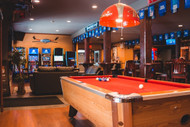Investment Game: Evaluating ROI for Coin-Operated Pool Tables
Posted by Home Billiards on 22nd May 2024
Coin-operated pool tables don’t just represent a fun night out — they can be powerful revenue generators!
Popular in bars, gaming arcades, and other recreational spaces, billiards remains a popular leisure activity, and coin-operated tables mean a blank space can be turned into a space that generates profit.
In this article, we look at the financial incentives and ROI you can reap from coin-operated pool tales, including how to maintain your table and maximize your profits.
TL;DR
- Coin-operated pool tables make money by charging per game, usually around $1 or $2 a play.
- They make the most money in high-traffic areas with lots of customers.
- Initial layout costs can be high, but the ROI is good, with revenue as high as $16,000 per year possible.
- Your profit will depend on the venue space lease costs, the table's initial outlay, and how much use your table gets.
- Digital payment options are available, which are more secure and popular with those who don’t always carry cash.
What is a Coin Operated Pool Table?
A coin-operated pool table is a billiards table that requires payment to unlock the game.
While coins are the most common method for unlocking the pool balls, some tables use tokens, and more modern versions are moving towards contactless payments. Users insert coins or pay via credit card, meaning these pool tables are self-service.
Coin-op tables, as they are colloquially called, are high-quality and commercial-grade to ensure they can withstand heavy and continuous use. This includes hardwearing felt and robust wooden construction.
They’re a great way to generate revenue in an unused space, and because they are self-service, they tend to be affordable to operate.
Ideal Locations for Coin-Operated Pool Tables
Coin-operated pool tables are best used in areas where many people are milling around on foot, looking for entertainment. While the classic location is a bar or pub, any location with plenty of foot traffic and people can work.
Some of the best locations include:
- Pubs and bars are the most popular locations for coin-operated pool tables, and it’s easy to see why. People are often gathered to socialize and are likely to be looking for leisure activities—perfect for a casual game of billiards.
- Malls and arcades: Malls or arcades are also great locations as people are usually looking for entertainment and are willing to spend money.
- Hotels or resorts: Similar to malls and arcades, hotels and resorts are ideal for installing gaming tables. People on vacation often look for fun things to do, which is the perfect way to enhance the guest experience.
- Campuses or military bases are great locations because they often have a lot of people congregating together, looking for something to do. The demographics are usually younger people who are more likely to be looking for recreational activities.
Revenue Potential of Coin-Operated Pool Tables
While it might seem that coin-operated pool tables generate only small changes, the revenue potential is significant, especially in particularly frequented places. Let’s break down the costs and look at how much money you can make from a coin-operated table:
First, let’s examine the pricing of a game. The standard cost is $1 to $2 per game, but these costs can be higher in more expensive venues, like upscale hotels.
Let’s break this down.
Say you’re charging around the average rate of $1.50 per game. If your table is used relatively infrequently, you’re making $450 a month or $5,400 a year for ten games a day.
While that may not sound like a lot, remember that this is almost passive income — you don’t need to do anything.
On the higher end of the spectrum, if you have a pool table where you charge $2 per game in a busy bar, you may see around 20 games played on weekdays and 30 on weekends.
This would generate about $1,376 in monthly revenue and $16,512 in yearly earnings. That’s not bad for an almost hands-free income source.
Costs and Time Investments

We’ve gone over revenue, but what about costs? In addition to the initial outlay of purchasing the table, most business owners won’t just let you put your pool table in their space out of the kindness of their hearts. If you don’t already own a business conducive to having a pool table, you’ll need to lease a space to keep it. This is usually done by the venue charging a percentage of your take (usually 50%), which can significantly reduce your net income.
Let’s examine costs, both upfront and ongoing, more closely.
Upfront Costs
- Purchase price: A good coin-operated pool table can cost between $4,000 to $10,000 or more.
While that might sound like a lot, remember that your pool table can last for many years, and you’ll likely make enough to fully cover the initial outlay during the first year of operation.
- Installation: The only other upfront costs are for assembly and delivery. These costs will vary depending on your location and how far the pool table needs to travel.
Maintenance Costs
- Regular maintenance: You’ll need to periodically repair or replace the felt, replace lost balls, and maintain the cues.
- Repair costs: Coin-operated billiard tables can sometimes sustain unexpected damage. Watch out for spills, tears in the felt, and even vandalism.
These can also be hard to predict, and if the unexpected repairs happen frequently, it can affect profitability.
- Coin collection: Most pool table owners collect the coins themselves, but if you don’t have time, you may need to pay someone to collect them periodically.
If your coin-op table uses contactless payments, you’ll also need to factor in merchant fees that credit card companies charge you to collect payments.
Factors Influencing Profitability
While some profitability may be based on luck, some factors can be controlled. Factors such as where you locate your table, the quality of the table itself, and the competitiveness of your pricing can dramatically increase your profits.
Location
Location is key. Busy spots like bars, rec centers, and college campuses are the best spots—basically, anywhere people congregate. The busier the location, the more potential players!
Table Quality
While a high-quality table may cost more upfront, its longevity and maintenance are well worth the investment.
A sturdy construction and high-quality, durable felt will need far fewer repairs and replacement parts than a cheap table. They also exude classy elegance, which can make subtle wonders and entice players to play one more game.
As you might expect, cheap tables are less satisfying to play on and can be off-putting for potential customers.
Foot Traffic
Foot traffic is essential for a profitable coin-operated pool table. Places with a high flow of people are likelier to see frequent play. Someone walking past might only sometimes have time to stop, but they may note the table's location for future games.
The more people that walk past and see your table, the more plays you’ll get and the higher your potential revenue.
Evolution: Coins vs. Digital Payments
While coin-operated pool tables are still common, there is beginning to be a shift towards digital payment. Contactless tables have many advantages, including:
- Security: The risk of theft is far lower with digital payment, as there are no coins to steal.
- Less risk of breakdown: Contactless systems take less wear and tear than coin slots, and you don’t have to worry about coins getting jammed.
- Convenience: Like it or not, many people don’t carry cash these days. Contactless payments appeal to younger, more tech-savvy customers who prefer contactless digital payment.
- Data analytics: Another great aspect of digital payments is that you can see when people are playing and analyze trends. This can help you change your pricing strategy and inform your decision-making if you invest in more tables.
FAQs
How profitable is a pool table?
Pool tables can be highly profitable, provided you do your research. By placing your table strategically and ensuring it will be used frequently, you can earn a significant monthly revenue. Yearly earnings can be more than $10,000 in passive income, depending on how much you charge and how many plays you get.
Are coin-op tables more expensive than ordinary pool tables?
Generally, yes. Great-quality coin-operated pool tables will likely set you back by thousands of dollars. At the same time, you can find an ordinary table that’s just wonderful for plays for several hundred dollars. That’s why it’s wiser to consider the costs and expected benefits of setting up a coin-op table and plan where to put it.
Which brands manufacture the best coin-operated pool tables?
If we’re talking coin-op pool tables, it’s hard to find a brand that outshines Valley.
They manufacture top-of-the-line tables with dollar bill acceptors (DBAs) that can even be programmed to change prices automatically depending on the time of day. Their tables are also sturdy and reliable.
Wrapping Up
Are you thinking about investing in a coin-operated pool table? Whether you’re planning to add one to your own venue or lease a space reserved entirely for one, this unconventional investment can generate a surprising amount of passive income!
Quality is the most important consideration when purchasing, and Home Billiards has a selection of high-end, durable coin-operated pool tables.
You can choose from ready-made and made-to-order varieties, but one thing stays the same — the quality, durability, and excellent service!

